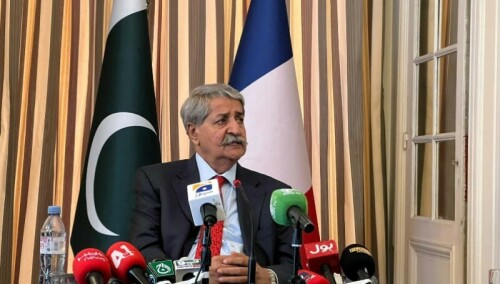ISLAMABAD: While pollen and weed related allergy has become a major problem in the federal capital, health authorities on Thursday held a brainstorming session to devise a plan for the eradication of factors that contribute to the allergy.
The plan will be submitted to the prime minister for his approval and the public will be requested to join hands in making Islamabad allergy free.
The meeting was chaired by Prime Minister’s Coordinator for Health Dr Mukhtar Bharath and attended by Secretary Health Nadeem Mahbub, the director general health, member environment CDA, Environment Protection Agency (EPA) chief, the head of allergy centre at NIH, the district health officer and Islamabad Health Regulatory Authority chief and senior officials from the ministry of health.
According to a statement, Dr Bharath highlighted the need for replacement of pollen producing trees in Islamabad to reduce the surge of allergy cases before the next season. He said proactive measures were being taken in the light of the vision of the prime minister.
PM’s coordinator on health highlights need for replacement of pollen producing trees in Islamabad
“The pollen count is on an incremental rise in last season in the capital city, so I have directed the ministry and relevant stakeholders to take immediate remedial measures while submitting a comprehensive plan aiming at significant reduction of allergy cases in Islamabad, prior to the next season,” he said.
He added that the pollen season was likely to start in early March in Islamabad and Rawalpindi and expected to attain peak during the second fortnight of March and extend till the end of April.
The Metrological Department identified paper mulberry trees as a significant contributor to pollens followed by pine trees and grasses that escalate the pollen count in the air.
The CDA member environment informed the meeting about the historical background and steps taken by CDA to reduce pollen count especially in F-9 Park area. The CDA also shared phase-wise plan to targeting pollens producing paper mulberry trees. The CDA stressed the need for an awareness campaign and taking on board relevant stakeholders and civil society as they foresee certain barriers in the way of such an activity.
The coordinator to the PM advised the officials for a combined effort to make public aware about the initiative as it entails to protect human health and aims to target allergens which are injurious to health. He also advised CDA to revise the plan and include more urban areas in phase-I considering the wind patterns in Islamabad.
The DG EPA said it should be a comprehensive replacement plan rather than tree cutting exercise and focus on removing invasive grass also from the selected areas. She emphasised the need to engaging educational institutions (schools, colleges and universities) in the awareness campaign.
She added that “peeli booti” used by flower shop owners to make bouquets was also widely causing allergies among the natives. She stressed the need for engaging the agriculture sector in the endeavour.
The secretary NHS emphasised the need for an urgent collaborative efforts and remedial measures before the upcoming pollen season for ensuring timely control of pollen allergies among the general public.
He unveiled plans to strengthening the allergy centre at NIH by increasing its capacity and conducting research in the domain. He also directed the DHO to involve medical and paramedical staff of BHUs to disseminate messages on protective and preventive measures.
The coordinator to the PM reinforced the government’s commitment, stating that health was top priority and a special emphasis was placed on reducing pollen allergies in the city in collaboration with relevant stakeholders,
“I take this opportunity to urge all concerned to submit revised plans immediately for submission to the Prime Minister for his approval, and public to join hands in making Islamabad allergy free,” he said.
Published in Dawn, November 29th, 2024















































Dear visitor, the comments section is undergoing an overhaul and will return soon.